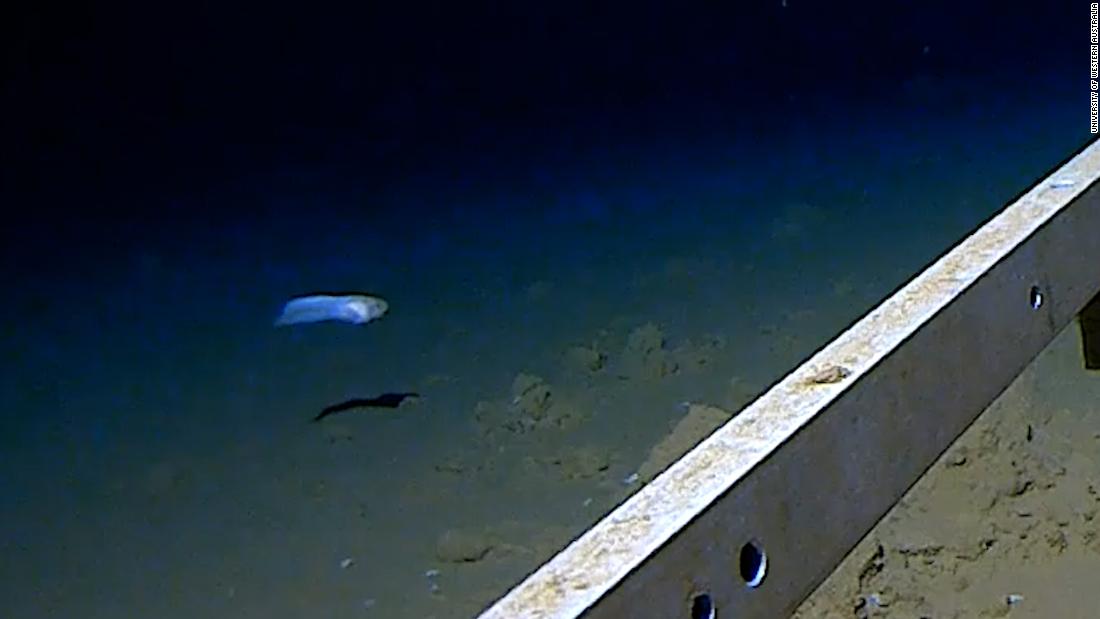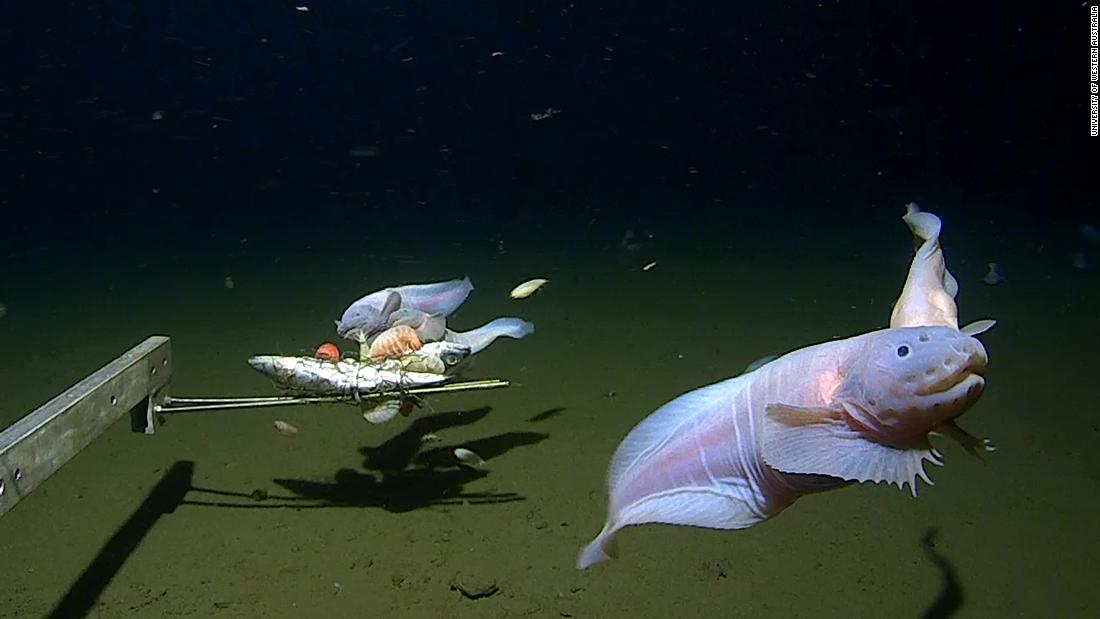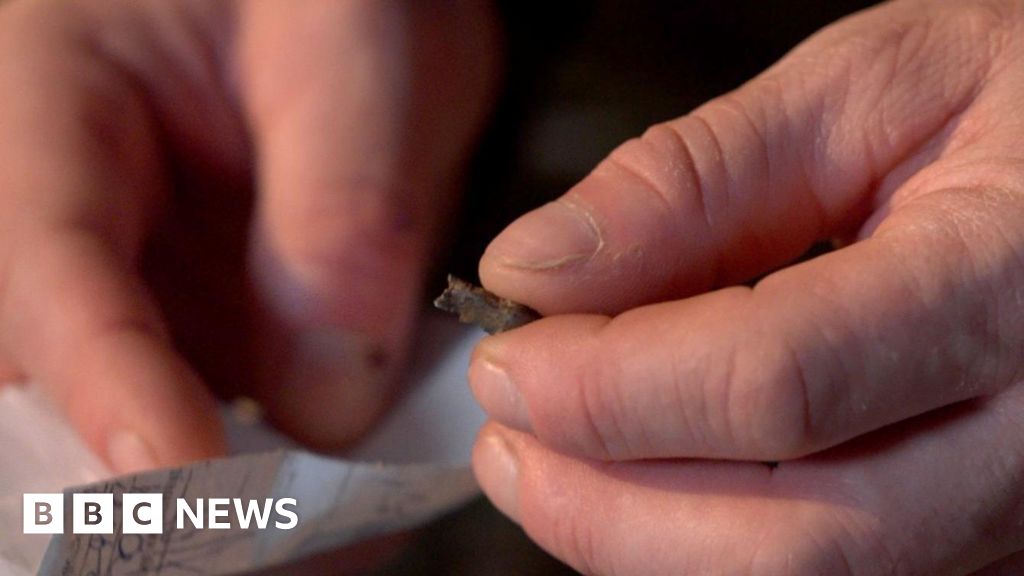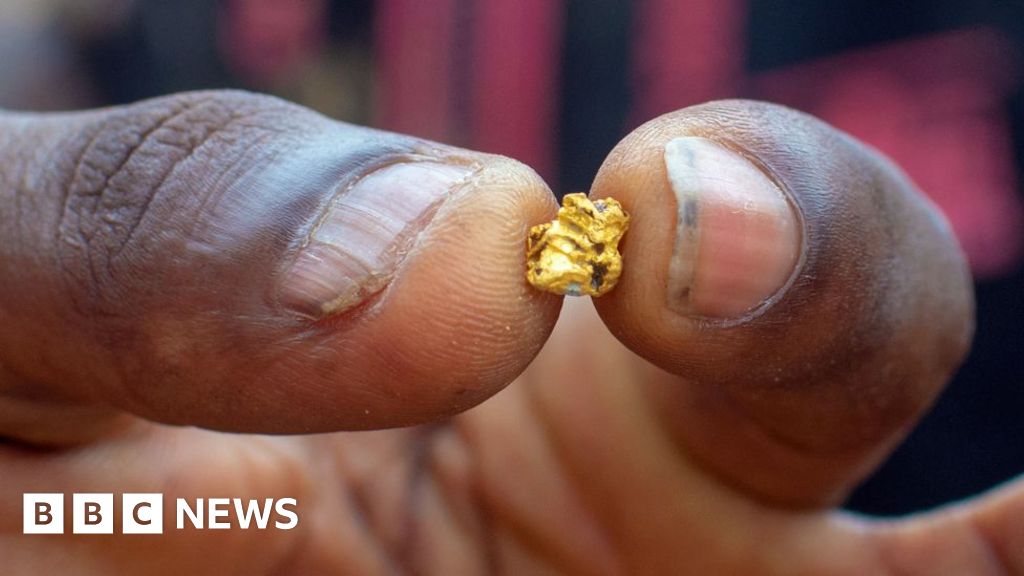Oamenii de știință au capturat specia necunoscută de pește-melc la o adâncime de peste 27.000 de picioare, ca parte a unei expediții în tranșee în largul coastei Japoniei.
Sursa: CNN

Oamenii de știință au capturat specia necunoscută de pește-melc la o adâncime de peste 27.000 de picioare, ca parte a unei expediții în tranșee în largul coastei Japoniei.
Sursa: CNN

00:55 – Source: CNN World News 27 videos 00:55 Now playing – Source: CNN 01:27 Now playing – Source: CNN 01:34 Now playing – Source: CNN 00:46 Now playing – Source: CNN 02:00 Now playing – Source: CNN ” data-timestamp-html=” Updated 11:32 AM EDT, Tue April 18, 2023 ” data-check-event-based-preview=”” data-is-vertical-video-embed=”false” data-network-id=”” data-publish-date=”2025-06-29T07:10:29.569Z” data-video-section=”world” data-canonical-url=”https://www.cnn.com/2025/06/29/world/video/thailand-cannabis-policy-u-turn-digvid” data-branding-key=”” data-video-slug=”thailand-cannabis-policy-u-turn-digvid” data-first-publish-slug=”thailand-cannabis-policy-u-turn-digvid” data-video-tags=”” data-breakpoints='{“video-resource–media-extra-large”: 660}’ data-display-video-cover=”true” data-details=””> 01:31 Now playing – Source: CNN 00:53 Now playing – Source: CNN 00:43 Now playing – Source: CNN 02:56 Now playing – Source: CNN 01:39 Now playing – Source: CNN By Jim Sciutto, CNN ” data-timestamp-html=” Updated 11:32 AM EDT, Tue April 18, 2023 ” data-check-event-based-preview=”” data-is-vertical-video-embed=”false” data-network-id=”” data-publish-date=”2025-06-28T01:44:46.532Z” data-video-section=”world” data-canonical-url=”https://www.cnn.com/2025/06/27/world/video/sergey-tikhanovsky-freed-belarus-prison-svetlana-tikhanovskaya-sciutto-digvid” data-branding-key=”” data-video-slug=”sergey-tikhanovsky-freed-belarus-prison-svetlana-tikhanovskaya-sciutto-digvid” data-first-publish-slug=”sergey-tikhanovsky-freed-belarus-prison-svetlana-tikhanovskaya-sciutto-digvid” data-video-tags=”” data-breakpoints='{“video-resource–media-extra-large”: 660}’ data-display-video-cover=”true” data-details=””> 01:40 Now playing – Source: CNN 01:01 Now playing – Source: CNN ” data-timestamp-html=” Updated 11:32 AM EDT, Tue April 18, 2023 ” data-check-event-based-preview=”” data-is-vertical-video-embed=”false” data-network-id=”” data-publish-date=”2025-06-27T11:01:35.943Z” data-video-section=”world” data-canonical-url=”https://www.cnn.com/2025/06/27/world/video/south-korea-seoul-fire-metro-digvid-ldn” data-branding-key=”” data-video-slug=”south-korea-seoul-fire-metro-digvid-ldn” data-first-publish-slug=”south-korea-seoul-fire-metro-digvid-ldn” data-video-tags=”” data-breakpoints='{“video-resource–media-extra-large”: 660}’ data-display-video-cover=”true” data-details=””> 00:24 Now playing – Source: CNN 00:42 Now playing – Source: CNN 01:25 Now playing – Source: CNN 00:47 Now playing – Source: CNN 00:42 Now playing – Source: CNN 01:11 Now playing – Source: CNN ” data-timestamp-html=” Updated 11:32 AM EDT, Tue April 18, 2023 ” data-check-event-based-preview=”” data-is-vertical-video-embed=”false” data-network-id=”” data-publish-date=”2025-06-26T15:35:18.560Z” data-video-section=”world” data-canonical-url=”https://www.cnn.com/2025/06/26/world/video/israeli-settler-attack-west-bank-digvid-ldn” data-branding-key=”” data-video-slug=”israeli-settler-attack-west-bank-digvid-ldn” data-first-publish-slug=”israeli-settler-attack-west-bank-digvid-ldn” data-video-tags=”” data-breakpoints='{“video-resource–media-extra-large”: 660}’ data-display-video-cover=”true” data-details=””> 00:49 Now playing – Source: CNN 01:44 Now playing – Source: CNN ” data-timestamp-html=” Updated 11:32 AM EDT, Tue April 18, 2023 ” data-check-event-based-preview=”” data-is-vertical-video-embed=”false” data-network-id=”” data-publish-date=”2025-06-26T13:15:45.531Z” data-video-section=”world” data-canonical-url=”https://www.cnn.com/2025/06/26/world/video/iran-strikes-dan-caine-digvid” data-branding-key=”” data-video-slug=”iran-strikes-dan-caine-digvid” data-first-publish-slug=”iran-strikes-dan-caine-digvid” data-video-tags=”” data-breakpoints='{“video-resource–media-extra-large”: 660}’ data-display-video-cover=”true” data-details=””> 00:55 Now playing – Source: CNN 00:50 Now playing – Source: CNN 01:05 Now playing – Source: CNN 01:19 Now playing – Source: CNN 01:28 Now playing – Source: CNN 03:00 Now playing – Source: CNN 02:00 Now playing – Source: CNN See More Videos
Sign up for CNN’s Wonder Theory science newsletter. Explore the universe with news on fascinating discoveries, scientific advancements and more.
CNN —
Cruising at a depth of 8,336 meters (over 27,000 feet) just above the seabed, a young snailfish has become the deepest fish ever filmed by scientists during a probe into the abyss of the northern Pacific Ocean.
Scientists from University of Western Australia and Tokyo University of Marine Science and Technology released footage of the snailfish on Sunday filmed last September by sea robots in deep trenches off Japan.
Along with the filming the deepest snailfish, the scientists physically caught two other specimens at 8,022 meters and set another record for the deepest catch.
Previously, the deepest snailfish ever spotted was at 7,703 meters in 2008, while scientists had never been able to collect fish from anywhere below 8,000 meters.
“What is significant is that it shows how far a particular type of fish will descend in the ocean,” said marine biologist Alan Jamieson, founder of the Minderoo-UWA Deep Sea Research Centre, who led the expedition.
Caladan Oceanic
Scientists are filming in the trenches off Japan as part of a 10-year study into the deepest fish populations in the world. Snailfish are members of Liparidae family, and while most snailfish live in shallow water, others survive at some of the greatest depths ever recorded, Jamieson said.
During the two-month survey last year, three “landers” – automatic sea robots fitted with high-resolution cameras – were dropped into three trenches – the Japan, Izu-Ogasawara and Ryukyu trenches – at varying depths.
In the Izu-Ogasawara trench, footage showed the deepest snailfish hovering calmly alongside other crustaceans on the seabed.
Jamieson classified the fish as a juvenile and said younger deep sea snailfish often stay as deep as possible to avoid being eaten by bigger predators that swim at shallower depths.
Another clip shot at between 7,500 and 8,200 meters in the same trench showed a colony of fish and crustaceans munching at bait tied to an undersea robot.
Images of the two captured snailfish – identified as Pseudoliparis belyaevi – provide a rare glimpse of the unique features that help the deep sea species survive the extreme environment.
They have tiny eyes, a translucent body, and their lack of swim bladder, which helps other fish float, works to their advantage, Jamieson said.
The professor said the Pacific Ocean is particularly conducive to vibrant activity due to its warm southern current, which encourages sea creatures to go deeper, while its abundant marine life provides a good source of food for bottom feeders.
Scientists would like to know more about creatures living at extreme depths, but cost is the constraint, Jamieson said, adding that each lander alone costs them $200,000 to assemble and operate.
“The challenges are that technology has been expensive and scientists don’t have a lot of money,” he said.
Sursa: CNN

Andrew Redington/Getty Images North America/Getty Images St. Louis Post-Dispatch/AP Bettmann Archive/Getty Images Augusta National/Getty Images Augusta National/Getty Images Augusta National/Getty Images David Cannon/Allsport/Getty Images David Cannon/Getty Images Europe/Getty Images Harry How/Getty Images Ezra Shaw / Getty Images Warren Little / Getty Images Donald Miralle/Getty Images Andrew Redington / Getty Images Harry How / Getty Images Jim Watson / AFP via Getty Images Sean M. Haffey / Getty Images Christian Petersen / Getty Images
Prev Next
Editor’s Note: This story was originally published in April 2023.
CNN —
Slumped on his club, head buried in his arm, Rory McIlroy looked on the verge of tears.
The then-21-year-old had just watched his ball sink into the waters of Rae’s Creek at Augusta National and with it, his dream of winning The Masters, a dream that had looked so tantalizingly close mere hours earlier.
As a four-time major winner and one of the most decorated names in the sport’s history, few players would turn down the chance to swap places with McIlroy heading into Augusta this week.
Yet on Sunday afternoon of April 10, 2011, not a golfer in the world would have wished to be in the Northern Irishman’s shoes.
A fresh-faced, mop-headed McIlroy had touched down in Georgia for the first major of the season with a reputation as the leading light of the next generation of stars.
An excellent 2010 had marked his best season since turning pro three years earlier, highlighted by a first PGA Tour win at the Quail Hollow Championship and a crucial contribution to Team Europe’s triumph at the Ryder Cup.
Yet despite a pair of impressive top-three finishes at the Open and PGA Championship respectively, a disappointing missed cut at The Masters – his first at a major – served as ominous foreshadowing.
McIlroy shot 74 and 77 to fall four strokes short of the cut line at seven-over par, a performance that concerned him enough to take a brief sabbatical from competition.
Harry How / Getty Images
But one year on in 2011, any lingering Masters demons looked to have been exorcised as McIlroy flew round the Augusta fairways.
Having opened with a bogey-free seven-under 65 – the first time he had ever shot in the 60s at the major – McIlroy pulled ahead from Spanish first round co-leader Alvaro Quirós with a second round 69.
It sent him into the weekend holding a two-shot cushion over Australia’s Jason Day, with Tiger Woods a further stroke behind and back in the hunt for a 15th major after a surging second round 66.
And yet the 21-year-old leader looked perfectly at ease with having a target on his back. Even after a tentative start to the third round, McIlroy rallied with three birdies across the closing six holes to stretch his lead to four strokes heading into Sunday.
Andrew Redington / Getty Images
The youngster was out on his own ahead of a bunched chasing pack comprising Day, Ángel Cabrera, K.J. Choi and Charl Schwartzel. After 54 holes, McIlroy had shot just three bogeys.
“It’s a great position to be in … I’m finally feeling comfortable on this golf course,” McIlroy told reporters.
“I’m not getting ahead of myself, I know how leads can dwindle away very quickly. I have to go out there, not take anything for granted and go out and play as hard as I’ve played the last three days. If I can do that, hopefully things will go my way.
“We’ll see what happens tomorrow because four shots on this golf course isn’t that much.”
Timothy A. Clary / AFP via Getty Images
The truth can hurt, and McIlroy was about to prove his assessment of Augusta to be true in the most excruciating way imaginable.
His fourth bogey of the week arrived immediately. Having admitted to expecting some nerves at the first tee, McIlroy sparked a booming opening drive down the fairway, only to miss his putt from five feet.
Three consecutive pars steadied the ship, but Schwartzel had the wind in his sails. A blistering birdie, par, eagle start had seen him draw level at the summit after his third hole.
A subsequent bogey from the South African slowed his charge, as McIlroy clung onto a one-shot lead at the turn from Schwartzel, Cabrera, Choi, and a rampaging Woods, who shot five birdies and an eagle across the front nine to send Augusta into a frenzy.
Despite his dwindling advantage and the raucous Tiger-mania din ahead of him, McIlroy had responded well to another bogey at the 5th hole, draining a brilliant 20-foot putt at the 7th to restore his lead.
The fist pump that followed marked the high-water point of McIlroy’s round, as a sliding start accelerated into full-blown free-fall at the par-four 10th hole.
His tee shot went careening into a tree, ricocheting to settle between the white cabins that separate the main course from the adjacent par-three course. It offered viewers a glimpse at a part of Augusta rarely seen on broadcast, followed by pictures of McIlroy anxiously peering out from behind a tree to track his follow-up shot.
Andrew Redington / Getty Images
Though his initial escape was successful, yet another collision with a tree and a two-putt on the green saw a stunned McIlroy eventually tap in for a triple bogey. Having led the field one hole and seven shots earlier, he arrived at the 11th tee in seventh.
By the time his tee drive at the 13th plopped into the creek, all thoughts of who might be the recipient of the green jacket had long-since switched away from the anguished youngster. It had taken him seven putts to navigate the previous two greens, as a bogey and a double bogey dropped him to five-under – the score he had held after just 11 holes of the tournament.
Mercifully, the last five holes passed without major incident. A missed putt for birdie from five feet at the final hole summed up McIlroy’s day, though he was given a rousing reception as he left the green.
video
Mere minutes earlier, the same crowd had erupted as Schwartzel sunk his fourth consecutive birdie to seal his first major title. After starting the day four shots adrift of McIlroy, the South African finished 10 shots ahead of him, and two ahead of second-placed Australian duo Jason Day and Adam Scott.
McIlroy’s eight-over 80 marked the highest score of the round. Having headlined the leaderboard for most of the week, he finished tied-15th.
Robyn Beck / AFP via Getty Images
Tears would flow during a phone call with his parents the following morning, but at his press conference, McIlroy was upbeat.
“I’m very disappointed at the minute, and I’m sure I will be for the next few days, but I’ll get over it,” he said.
“I was leading this golf tournament with nine holes to go, and I just unraveled … It’s a Sunday at a major, what it can do.
“This is my first experience at it, and hopefully the next time I’m in this position I’ll be able to handle it a little better. I didn’t handle it particularly well today obviously, but it was a character-building day … I’ll come out stronger for it.”
Once again, McIlroy would be proven right.
Just eight weeks later in June, McIlroy rampaged to an eight-shot victory at the US Open. Records tumbled in his wake at Congressional, as he shot a tournament record 16-under 268 to become the youngest major winner since Tiger Woods at The Masters in 1997.
Jim Watson / AFP via Getty Images
The historic victory kickstarted a golden era for McIlroy. After coasting to another eight-shot win at the PGA Championship in 2012, McIlroy became only the third golfer since 1934 to win three majors by the age of 25 with triumph at the 2014 Open Championship.
Before the year was out, he would add his fourth major title with another PGA Championship win.
And much of it was owed to that fateful afternoon at Augusta. In an interview with the BBC in 2015, McIlroy dubbed it “the most important day” of his career.
“If I had not had the whole unravelling, if I had just made a couple of bogeys coming down the stretch and lost by one, I would not have learned as much.
“Luckily, it did not take me long to get into a position like that again when I was leading a major and I was able to get over the line quite comfortably. It was a huge learning curve for me and I needed it, and thankfully I have been able to move on to bigger and better things.
“Looking back on what happened in 2011, it doesn’t seem as bad when you have four majors on your mantelpiece.”
Tom Pennington / Getty Images
McIlroy’s contentment came with a caveat: it would be “unthinkable” if he did not win The Masters in his career.
Yet as he prepares for his 15th appearance at Augusta National this week, a green jacket remains an elusive missing item from his wardrobe.
Despite seven top-10 finishes in his past 10 Masters outings, the trophy remains the only thing separating McIlroy from joining the ranks of golf immortals to have completed golf’s career grand slam of all four majors in the modern era: Gene Sarazen, Ben Hogan, Gary Player, Jack Nicklaus, and Tiger Woods.
Mike Mulholland / Getty Images
A runner-up finish to Scottie Scheffler last year marked McIlroy’s best finish at Augusta, yet arguably 2011 remains the closest he has ever been to victory. A slow start in 2022 meant McIlroy had begun Sunday’s deciding round 10 shots adrift of the American, who teed off for his final hole with a five-shot lead despite McIlroy’s brilliant 64 finish.
video
At 33 years old, time is still on his side. Though 2022 extended his major drought to eight years, it featured arguably his best golf since that golden season in 2014.
And as McIlroy knows better than most, things can change quickly at Augusta National.
Sursa: CNN

CNN —
It is one of China’s most popular shopping apps, selling clothing, groceries and just about everything else under the sun to more than 750 million users a month.
But according to cybersecurity researchers, it can also bypass users’ cell phone security to monitor activities on other apps, check notifications, read private messages and change settings.
And once installed, it’s tough to remove.
While many apps collect vast troves of user data, sometimes without explicit consent, experts say e-commerce giant Pinduoduo has taken violations of privacy and data security to the next level.
In a detailed investigation, CNN spoke to half a dozen cybersecurity teams from Asia, Europe and the United States — as well as multiple former and current Pinduoduo employees — after receiving a tipoff.
Multiple experts identified the presence of malware on the Pinduoduo app that exploited vulnerabilities in Android operating systems. Company insiders said the exploits were utilized to spy on users and competitors, allegedly to boost sales.
“We haven’t seen a mainstream app like this trying to escalate their privileges to gain access to things that they’re not supposed to gain access to,” said Mikko Hyppönen, chief research officer at WithSecure, a Finnish cybersecurity firm.
“This is highly unusual, and it is pretty damning for Pinduoduo.”
This is highly unusual, and it is pretty damning for Pinduoduo.
Mikko Hyppönen, cybersecurity expert
Malware, short for malicious software, refers to any software developed to steal data or interfere with computer systems and mobile devices.
Evidence of sophisticated malware in the Pinduoduo app comes amid intense scrutiny of Chinese-developed apps like TikTok over concerns about data security.
Some American lawmakers are pushing for a national ban on the popular short-video app, whose CEO Shou Chew was grilled by Congress for five hours last week about its relations with the Chinese government.
The revelations are also likely to draw more attention to Pinduoduo’s international sister app, Temu, which is topping US download charts and fast expanding in other Western markets. Both are owned by Nasdaq-listed PDD, a multinational company with roots in China.
While Temu has not been implicated, Pinduoduo’s alleged actions risk casting a shadow over its sister app’s global expansion.
There is no evidence that Pinduoduo has handed data to the Chinese government. But as Beijing enjoys significant leverage over businesses under its jurisdiction, there are concerns from US lawmakers that any company operating in China could be forced to cooperate with a broad range of security activities.
Mike Segar/Reuters/File
The findings follow Google’s suspension of Pinduoduo from its Play Store in March, citing malware identified in versions of the app.
An ensuing report from Bloomberg said a Russian cybersecurity firm had also identified potential malware in the app.
Pinduoduo has previously rejected “the speculation and accusation that Pinduoduo app is malicious.”
CNN has contacted PDD multiple times over email and phone for comment, but has not received a response.
Pinduoduo, which boasts a user base that accounts for three quarters of China’s online population and a market value three times that of eBay (EBAY), wasn’t always an online shopping behemoth.
Founded in 2015 in Shanghai by Colin Huang, a former Google employee, the startup was fighting to establish itself in a market long dominated by e-commerce stalwarts Alibaba (BABA) and JD.com (JD).
It succeeded by offering steep discounts on friends-and-family group buying orders and focusing on lower-income rural areas.
Pinduoduo posted triple digit growth in monthly users until the end of 2018, the year it listed in New York. By the middle of 2020, though, the increase in monthly users had slowed to around 50% and would continue to decline, according to its earnings reports.
VCG/VCG/Getty Images/File
It was in 2020, according to a current Pinduoduo employee, that the company set up a team of about 100 engineers and product managers to dig for vulnerabilities in Android phones, develop ways to exploit them — and turn that into profit.
According to the source, who requested anonymity for fear of reprisals, the company only targeted users in rural areas and smaller towns initially, while avoiding users in megacities such as Beijing and Shanghai.
“The goal was to reduce the risk of being exposed,” they said.
By collecting expansive data on user activities, the company was able to create a comprehensive portrait of users’ habits, interests and preferences, according to the source.
This allowed it to improve its machine learning model to offer more personalized push notifications and ads, attracting users to open the app and place orders, they said.
The team was disbanded in early March, the source added, after questions about their activities came to light.
PDD didn’t reply to CNN’s repeated requests for comment on the team.
Approached by CNN, researchers from Tel Aviv-based cyber firm Check Point Research, Delaware-based app security startup Oversecured and Hyppönen’s WithSecure conducted independent analysis of the 6.49.0 version of the app, released on Chinese app stores in late February.
Google Play is not available in China, and Android users in the country download their apps from local stores. In March, when Google suspended Pinduoduo, it said it had found malware in off-Play versions of the app.
The researchers found code designed to achieve “privilege escalation”: a type of cyberattack that exploits a vulnerable operating system to gain a higher level of access to data than it’s supposed to have, according to experts.
“Our team has reverse engineered that code and we can confirm that it tries to escalate rights, tries to gain access to things normal apps wouldn’t be able to do on Android phones,” said Hyppönen.
Luo Yunfei/China News Service/VCG/Getty Images
The app was able to continue running in the background and prevent itself from being uninstalled, which allowed it to boost its monthly active user rates, Hyppönen said. It also had the ability to spy on competitors by tracking activity on other shopping apps and getting information from them, he added.
Check Point Research additionally identified ways in which the app was able to evade scrutiny.
The app deployed a method that allowed it to push updates without an app store review process meant to detect malicious applications, the researchers said.
They also identified in some plug-ins the intent to obscure potentially malicious components by hiding them under legitimate file names, such as Google’s.
“Such a technique is widely used by malware developers that inject malicious code into applications that have legitimate functionality,” they said.
In China, about three quarters of smartphone users are on the Android system. Apple (AAPL)’s iPhone has 25% market share, according to Daniel Ives of Wedbush Securities.
Sergey Toshin, the founder of Oversecured, said Pinduoduo’s malware specifically targeted different Android-based operating systems, including those used by Samsung, Huawei, Xiaomi and Oppo.
CNN has reached out to these companies for comment.
Toshin described Pinduoduo as “the most dangerous malware” ever found among mainstream apps.
“I’ve never seen anything like this before. It’s like, super expansive,” he said.
Most phone manufacturers globally customize the core Android software, the Android Open Source Project (AOSP), to add unique features and applications to their own devices.
Toshin found Pinduoduo to have exploited about 50 Android system vulnerabilities. Most of the exploits were tailor made for customized parts known as the original equipment manufacturer (OEM) code, which tends to be audited less often than AOSP and is therefore more prone to vulnerabilities, he said.
Pinduoduo also exploited a number of AOSP vulnerabilities, including one which was flagged by Toshin to Google in February 2022. Google fixed the bug this March, he said.
I’ve never seen anything like this before. It’s like, super expansive.
Sergey Toshin, Android security expert
According to Toshin, the exploits allowed Pinduoduo access to users’ locations, contacts, calendars, notifications and photo albums without their consent. They were also able to change system settings and access users’ social network accounts and chats, he said.
Of the six teams CNN spoke to for this story, three did not conduct full examinations. But their primary reviews showed that Pinduoduo asked for a large number of permissions beyond the normal functions of a shopping app.
They included “potentially invasive permissions” such as “set wallpaper” and “download without notification,” said René Mayrhofer, head of the Institute of Networks and Security at the Johannes Kepler University Linz in Austria.
Sheldon Cooper/SOPA Images/LightRocket/Getty Images
Suspicions about malware in Pinduoduo’s app were first raised in late February in a report by a Chinese cybersecurity firm called Dark Navy. Even though the analysis didn’t directly name the shopping giant, the report spread quickly among other researchers, who did name the company. Some of the analysts followed up with their own reports confirming the original findings.
Soon after, on March 5, Pinduoduo issued a new update of its app, version 6.50.0, which removed the exploits, according to two experts who CNN spoke to.
Two days after the update, Pinduoduo disbanded the team of engineers and product managers who had developed the exploits, according to the Pinduoduo source.
The next day, team members found themselves locked out of Pinduoduo’s bespoke workplace communication app, Knock, and lost access to files on the company’s internal network. Engineers also found their access to big data, data sheets and the log system revoked, the source said.
Most of the team were transferred to work at Temu. They were assigned to different departments at the subsidiary, with some working on marketing or developing push notifications, according to the source.
A core group of about 20 cybersecurity engineers who specialize in finding and exploiting vulnerabilities remain at Pinduoduo, they said.
Toshin of Oversecured, who looked into the update, said although the exploits were removed, the underlying code was still there and could be reactivated to carry out attacks.
Pinduoduo has been able to grow its user base against a backdrop of the Chinese government’s regulatory clampdown on Big Tech that began in late 2020.
That year, the Ministry of Industry and Information Technology launched a sweeping crackdown on apps that illegally collect and use personal data.
In 2021, Beijing passed its first comprehensive data privacy legislation.
The Personal Information Protection Law stipulates that no party should illegally collect, process or transmit personal information. They’re also banned from exploiting internet-related security vulnerabilities or engaging in actions that endanger cybersecurity.
Pinduoduo’s apparent malware would be a violation of those laws, tech policy experts say, and should have been detected by the regulator.
“This would be embarrassing for the Ministry of Industry and Information Technology, because this is their job,” said Kendra Schaefer, a tech policy expert at Trivium China, a consultancy. “They’re supposed to check Pinduoduo, and the fact that they didn’t find (anything) is embarrassing for the regulator.”
The ministry has regularly published lists to name and shame apps found to have undermined user privacy or other rights. It also publishes a separate list of apps that are removed from app stores for failing to comply with regulations.
Pinduoduo did not appear on any of the lists.
They’re supposed to check Pinduoduo, and the fact that they didn’t find (anything) is embarrassing for the regulator.
Kendra Schaefer, tech policy expert
CNN has reached out to the Ministry of Industry and Information Technology and the Cyberspace Administration of China for comment.
On Chinese social media, some cybersecurity experts questioned why regulators haven’t taken any action.
“Probably none of our regulators can understand coding and programming, nor do they understand technology. You can’t even understand the malicious code when it’s shoved right in front of your face,” a cybersecurity expert with 1.8 million followers wrote last week in a viral post on Weibo, a Twitter-like platform.
The post was censored the next day.
CNN’s Kristie Lu Stout and Sean Lyngaas contributed reporting.
Sursa: CNN

Sursa: CNN

01:06 – Sursă: CNN Politics of the Day 22 videoclipuri 01:06 Se redă acum – Sursă: CNN 05:57 Se redă acum – Sursă: CNN 01:40 Se redă acum – Sursă: CNN 05:16 Se redă acum – Sursă: CNN 04:42 Se redă acum – Sursă: CNN 01:36 Se redă acum – Sursă: CNN De Harry Enten, CNN ” data-timestamp-html=” Actualizat la 17:01 EDT, marți, 4 aprilie 2023 ” data-check-event-based-preview=”” data-is-vertical-video-embed=”false” data-network-id=”” data-publish-date=”2025-06-29T22:10:26.111Z” data-video-section=”politică” data-canonical-url=”https://www.cnn.com/2025/06/29/politics/video/trump-big-beautiful-bill-agenda-approval-polling-harry-enten-digvid” data-branding-key=”” data-video-slug=”trump-big-beautiful-bill-agenda-approval-polling-harry-enten-digvid” data-first-publish-slug=”trump-big-beautiful-bill-agenda-approval-polling-harry-enten-digvid” data-video-tags=”” data-breakpoints='{“video-resource–media-extra-large”: 660}’ data-display-video-cover=”true” data-details=””> 02:46 Se redă acum – Sursă: CNN 00:51 Se redă acum – Sursă: CNN 01:42 Se redă acum – Sursă: CNN 00:46 Se redă acum – Sursă: CNN ” data-timestamp-html=” Actualizat marți, 4 aprilie 2023, ora 17:01 EDT. 02:24 Se redă acum – Sursă: CNN 00:43 Se redă acum – Sursă: CNN 00:50 Se redă acum – Sursă: CNN 02:14 Se redă acum – Sursă: CNN 07:37 Se redă acum – Sursă: CNN 03:18 Se redă acum – Sursă: CNN 01:11 Se redă acum – Sursă: CNN 05:48 Se redă acum – Sursă: CNN ” data-timestamp-html=” Actualizat la 17:01 EDT, marți, 4 aprilie 2023 ” data-check-event-based-preview=”” data-is-vertical-video-embed=”false” data-network-id=”” data-publish-date=”2025-06-26T13:15:45.531Z” data-video-section=”world” data-canonical-url=”https://www.cnn.com/2025/06/26/world/video/iran-strikes-dan-caine-digvid” data-branding-key=”” data-video-slug=”iran-strikes-dan-caine-digvid” data-first-publish-slug=”iran-strikes-dan-caine-digvid” data-video-tags=”” data-breakpoints='{“video-resource–media-extra-large”: 660}’ data-display-video-cover=”true” data-details=””> 00:55 Se redă acum – Sursă: CNN 00:50 Se redă acum – Sursă: CNN 10:05 Se redă acum – Sursă: CNN 01:27 Se redă acum – Sursă: CNN Vedeți mai multe videoclipuri CNN
Fostul președinte Donald Trump a fost acuzat de 34 de infracțiuni într-un rechizitoriu publicat marți.
Citiți rechizitoriul și prezentarea faptelor aici.
Sursa: CNN

Sursa: CNN

acum 17 oreDistribuieSalveazăAnastasiya GribanovaBBC Ukrainian Service, KievScarlett BarterBBC World ServiceDistribuieSalveazăKevin McGregor / BBCSoldatul ucrainean Serhiy Melnyk ține în mână bucata de șrapnel care i-a fost odată înfiptă în inimă
Din buzunar, Serhiy Melnyk scoate un mic ciob ruginit, învelit frumos în hârtie.
Îl ridică. „Mi-a zgâriat rinichiul, mi-a străpuns plămânul și inima” spune soldatul ucrainean în șoaptă.
Urme de sânge uscat sunt încă vizibile pe șrapnelele provenite de la o dronă rusească care i s-au înfipt în inimă în timp ce lupta în estul Ucrainei.
„Nici măcar nu mi-am dat seama ce era la început – am crezut că pur și simplu mi-e lipsă de aer sub armura antiglonț”, spune el. „A trebuit să-mi extragă șrapnel din inimă.”
Odată cu creșterea numărului de războie cu drone în Ucraina, aceste răni devin din ce în ce mai frecvente. Dronele transportă adesea arme și materiale care se fragmentează și provoacă răni mai complexe cauzate de șrapnel.
Potrivit medicilor militari ucraineni, rănile din șrapnel reprezintă acum până la 80% din traumatismele de pe câmpul de luptă.
Netratată, rana lui Serhiy ar fi fost fatală.
„Fragmentul era ascuțit ca o lamă. Doctorii au spus că era o bucată mare și că am avut noroc să supraviețuiesc”, spune el gânditor.
Dar nu doar norocul l-a salvat, ci o nouă tehnologie medicală. Un extractor magnetic.
Kevin McGregor / BBCEchipa lui Serhiy Maksymenko a îndepărtat șrapnelul din inima lui Serhiy
Chirurgul cardiovascular Serhiy Maksymenko arată imagini cu fragmentul de metal prins în inima bătătoare a lui Serhiy înainte ca acesta să fie îndepărtat delicat de un dispozitiv subțire cu vârf magnetic.
„Nu trebuie să faceți tăieturi mari în inimă”, explică Dr. Maksymenko. „Fac doar o mică incizie, introduc magnetul și acesta scoate șrapnelul.”
În doar un an, echipa doctorului Maksymenko a efectuat peste 70 de operații cardiace cu succes cu ajutorul dispozitivului, care a schimbat fața medicinei de primă linie din Ucraina.
Dezvoltarea acestor extractoare a venit după ce medicii de primă linie au evidențiat nevoia urgentă de a avea o modalitate sigură, rapidă și minim invazivă de a îndepărta șrapnelul.
Oleh Bykov – care a lucrat ca avocat – a condus această dezvoltare. Din 2014, el sprijină armata ca voluntar. A întâlnit medici pe linia frontului și din conversațiile sale au fost create extractoarele magnetice.
Conceptul nu este nou. Magneții au fost folosiți pentru îndepărtarea metalului din răni încă din timpul Războiului Crimeii, în anii 1850. Dar echipa lui Oleh a modernizat abordarea, creând modele flexibile pentru chirurgia abdominală, microextractoare pentru lucrări delicate și instrumente de înaltă rezistență pentru oase.
Operațiile au devenit mai precise și mai puțin invazive. Magnetul poate fi plasat de-a lungul suprafeței unei răni pentru a extrage fragmente. Chirurgii fac apoi o mică incizie, iar piesa este îndepărtată.
Ținând în mână o unealtă subțire în formă de stilou, Oleh își demonstrează puterea ridicând un baros cu vârful magnetic.
Kevin McGregor / BBCMagneții sunt suficient de puternici pentru a ridica un baros.
Munca sa a fost lăudată de alți medici de război, inclusiv de David Nott, un veteran al zonelor de război din întreaga lume.
„În război, se dezvoltă lucruri la care nu s-ar fi gândit niciodată în viața civilă.” spune el.
Rănile prin fragmentare au crescut din cauza schimbării feței războiului și, deoarece durează mult timp pentru a fi găsite, el crede că acest dispozitiv ar putea schimba regulile jocului.
El spune că căutarea șrapnelelor la pacienți este ca „a căuta un ac într-un car cu fân” – nu are întotdeauna succes și întârzie tratamentul altor victime.
Căutarea manuală a fragmentelor poate fi periculoasă și necesită incizii mai mari, care pot provoca mai multe sângerări – „așa că a le putea găsi pur și simplu folosind un magnet este ingenios.”
Centrul cardiac DniproExtractorul magnetic care a îndepărtat șrapnelele din inima lui Serhiy
Ceea ce a început ca un instrument de teren a fost acum lansat în toată Ucraina, cu 3.000 de unități distribuite spitalelor și medicilor din prima linie, precum Andriy Alban, care spune că a ajuns să se bazeze pe acest dispozitiv.
El lucrează adesea sub foc, în tranșee sau în clinici improvizate în aer liber și uneori fără anestezie locală.
„Sarcina mea este să salvez vieți – să bandajez rănile și să evacuez soldații”, spune el.
Nu a existat nicio certificare oficială a extractorului magnetic.
Ministerul Sănătății din Ucraina afirmă că dispozitivele medicale trebuie să respecte pe deplin reglementările tehnice. Totuși, în cazuri excepționale, cum ar fi legea marțială sau starea de urgență, utilizarea dispozitivelor necertificate este permisă pentru a satisface nevoile armatei și ale forțelor de securitate.
În culmea războiului, nu există timp pentru birocrație, explică creierul Oleh. „Aceste dispozitive salvează vieți. Dacă cineva consideră că acțiunile mele sunt o crimă, îmi asum responsabilitatea. Sunt chiar pregătit să merg la închisoare dacă se ajunge la asta. Dar atunci toți medicii care folosesc aceste dispozitive ar trebui și ei închiși”, adaugă el pe jumătate în glumă.
David Nott este de acord că certificarea nu este o prioritate maximă deocamdată și consideră că dispozitivul s-ar putea dovedi util în alte zone de război, cum ar fi Gaza.
„În război, nu este cu adevărat necesar.” „Faci doar lucrurile importante pentru a salva vieți.”
Înapoi la Lviv, soția lui Serhiy, Iulia, este recunoscătoare că soțul ei a supraviețuit rănii.
„Vreau doar să-i laud pe cei care au inventat acest extractor”, spune ea cu lacrimi în ochi. „Datorită lor, soțul meu este în viață.”
Reportaj suplimentar de Jasmin Dyer și Kevin McGregor.
Război în UcrainaRusiaUcraina
Sursa: BBC News

16 hours agoShareSaveJacob BoswallBBC MonitoringShareSaveGetty Images
It has been a good year for gold. A host of turbulent events in the global economy has driven up prices for the glittery commodity to record highs in 2025.
In a world of tariffs and international conflict, gold appeals to investors as one of the few remaining stable assets. Everyone wants a piece of the action, from central banks to large institutions like hedge funds, and retail investors. But few know where their gold comes from, or much about the conflicts it may be fuelling in the countries where it is mined.
For the governments of West Africa's Sahel region, the stakes are even higher. Gold is a lifeline for the military juntas of Burkina Faso, Mali, and Niger, who are beleaguered by jihadist insurgencies, regional isolation, and the ravages of climate change.
"Because gold prices have been at a historic high… the military governments are hoping that they will be able to benefit directly," Beverly Ochieng, a senior researcher at global consultancy firm Control Risks, told the BBC.
Together, the three Sahel states produce around 230 tonnes of gold per year, according to the World Gold Council's estimates, or about sovereignty" – though Russian firms are increasing their stake in the industry at the expense of Western-owned firms.
For example, Mali's junta leader Gen Assimi Goïta laid the foundation stone last month for a gold refinery, in which a Russian conglomerate, the Yadran Group, will have a minority stake. The refinery will reportedly create 500 direct jobs and 2,000 indirect jobs.
Burkina Faso is also building its first-ever gold refinery, and has set up a state-owned mining company, requiring foreign firms to give it a 15% stake in their local operations and to transfer skills to Burkinabé people.
Fake AI media campaigns have even been launched to celebrate the country's charismatic 37-year-old military ruler Capt Ibrahim Traoré for commanding such an important revenue stream for the nation.
"Mining gold from deepest dirt. But souls are rich and true," croons an AI-generated Rihanna in one recent song, pouring her silky, auto-tuned praise on Capt Traoré.
The reality is very different, according to Ms Ochieng, who explained that Burkina Faso and its neighbours need quick cash to fund counterinsurgency campaigns.
In the case of Mali, much of this has been outsourced to Russian mercenaries, including the Wagner Group and its successor, Africa Corps, which falls under the command of Russia's defence ministry.
Africa Corps has been involved in military training in Burkina Faso, but the junta officially denies its presence.
RIA Novosti / Anadolu / Getty ImagesRussia's President Vladimir Putin and Burkina Faso's Ibrahim Traoré have built a strong relationship
Although public spending transparency in the countries is poor, the governments are thought to devote large portions of their budgets to national security.
Military spending in Mali trebled since 2010, amounting to 22% of the national budget by 2020.
The governments are fighting jihadist groups linked to al-Qaeda and Islamic State (IS).
But campaign group Human Rights Watch (HRW) has accused the Malian government and the Wagner Group of committing atrocities against civilians, including unlawful killings, summary executions, and torture.
It has documented similar atrocities by Burkina Faso's military and its allied militias.
For their services, the Wagner Group and now Africa Corps are often paid directly in gold or in mining concessions, according to Alex Vines of the London-based Chatham House think-tank.
"Very little [of the gold revenues] will trickle down to Malians and Burkinabés," he told the BBC, adding that in fact the armed insurgents themselves may be benefiting from gold.
Since the coup in Mali in 2021, brutal government tactics against communities suspected of harbouring or sympathising with jihadists have increased, pushing more civilians to join the very groups they are fighting.
Jamaat Nusrat al-Islam wal-Muslimin (JNIM), an al-Qaeda affiliate which is the most active jihadist group in the region, staged an unprecedented number of attacks targeting Burkina Faso military during the first half of 2025, a sign of the group's growing strength.
The armed groups are also literally cashing in on the increased global appetite for gold.
A large proportion of gold mining in the Sahel is from the artisanal and small-scale sector, which is often informal, meaning it takes place on unlicensed and undeclared sites away from government oversight, according to a 2023 report on gold mining in the Sahel by the United Nations Office on Drugs and Crime (UNODC).
Armed groups, including jihadist groups, and Sahel governments are in competition for control over many of these small-scale gold mines.
Gold provides an important revenue stream for militant groups, which appear to be expanding their territorial influence in both Mali and Burkina Faso.
The UNODC believes that most gold from this type of mining ends up in the United Arab Emirates (UAE), a global centre for gold refining and trading.
"You do see overlap of violent extremist groups moving onto artisanal production areas for control," said Dr Vines.
The global spike in gold prices may be prolonging and exacerbating conflict in the Sahel – but, unfortunately for the diggers in artisanal gold mines, it has not led to owners increasing their wages.
Afrikimages Agency / Universal Images Group / Getty ImagesAs jobs are scarce, many people work in the informal mining sector
One gold miner in Mali's northern Kidal region agreed to respond to written questions from the BBC on condition of anonymity, for fear of his safety.
He estimated that, on a "good day", he earns 10,000 to 20,000 CFA francs, or approximately Prices went up, but the extra profit goes to mine owners… It's risky and uncertain, but for many of us, it's the only option," he added.
Dr Vines, who formerly worked as a blood diamond investigator for the UN, is concerned that gold has become Africa's new main conflict commodity.
He noted that gold has not received the same international attention as diamonds, which fuelled bloodshed in several African states throughout the 20th Century, especially during the 1990s.
Intervention by human rights groups and the UN led to the establishment of the Kimberley Process Certification Scheme in 2003, which did much to end the sale of so-called "blood diamonds" on the open market.
But attempts to crack down on "blood gold" have been less successful.
This is partly due to a lack of unified ethical standards. The London Bullion Market Association (LBMA), a major authority in the gold market, requires refiners to comply with standards based on guidelines set by a global body, the Organisation for Economic Co-operation and Development (OED).
The UAE's enforcement of these regulations has historically been patchy.
In 2021, the country announced its own standards for ethical gold mining – however, the framework remains voluntary. The issue of enforcement has caused tensions in the past between the Gulf state and the LBMA.
Tracing technology represents another hurdle.
"There is no 'DNA testing' for gold. With a lot of effort, you can trace diamonds before they get polished and cut… But I haven't seen ways of tracing the origins of a gold nugget," Dr Vines said.
Gold is smelted early on in the value chain, making it nearly impossible to trace and connect to potential conflict zones, he explained.
Dr Vines believes that it is likely that some blood gold from the Sahel ends up in UK markets.
"[Gold] gets smelted in [the] UAE, then goes onto the jewellery manufacturing industry, or into dentistry, or bullion. Some of it clearly comes into the UK. And once it is here, there is no way of testing what it is."
Another reason that it will be difficult to repeat the successes of the Kimberley process, according to Dr Vines, is because the certification system was not designed to deal with state governments.
"Kimberley was designed to deal with armed non-state actors in places like Sierra Leone and Liberia," he said.
For now, gold's importance for Sahel governments and the patchy enforcement of ethical gold standards mean that the commodity is likely to continue changing hands, regardless of its origin.
Unfortunately for some communities in the Sahel, that may mean paying for the trade in blood.
Getty Images/BBC
Go to BBCAfrica.com for more news from the African continent.
Follow us on Twitter @BBCAfrica, on Facebook at BBC Africa or on Instagram at bbcafrica
BBC Africa podcasts
Burkina FasoSahel Islamist insurgencyMaliNigerAfricaGold
Sursa: BBC News

acum 12 oreDistribuieSalveazăTabby WilsonBBC News, SydneyDistribuieSalveazăReutersCompania aeriană declară că nu va exista niciun impact asupra operațiunilor Qantas
Qantas contactează clienții după ce un atac cibernetic a vizat platforma lor terță de servicii pentru clienți.
Pe 30 iunie, compania aeriană australiană a detectat „activitate neobișnuită” pe o platformă utilizată de centrul său de contact pentru a stoca datele a șase milioane de persoane, inclusiv nume, adrese de e-mail, numere de telefon, date de naștere și numere de listă de fidelitate.
La detectarea breșei de securitate, Qantas a luat „măsuri imediate și a izolat sistemul”, potrivit unui comunicat.
Compania investighează încă amploarea completă a breșei de securitate, dar spune că se așteaptă ca proporția de date furate să fie „semnificativă”.
A asigurat publicul că detaliile pașaportului, detaliile cardului de credit și informațiile financiare personale nu au fost păstrate în sistemul spart și că niciun cont de listă, parolă sau cod PIN nu a fost compromis.
Qantas a notificat Poliția Federală Australiană cu privire la breșă, precum și Departamentul Cibernetic Australian Centrul de Securitate și Biroul Comisarului Australian pentru Informații.
„Ne cerem sincere scuze clienților noștri și recunoaștem incertitudinea pe care o va cauza acest lucru”, a declarat Vanessa Hudson, CEO-ul Grupului Qantas.
Ea a rugat clienții să apeleze linia de asistență dedicată dacă au nelămuriri și a confirmat că nu va exista niciun impact asupra Qantas. operațiunilor sau siguranța companiei aeriene.
Atacul vine la doar câteva zile după ce FBI a emis o alertă cu privire la X, avertizând că sectorul aerian era o țintă a grupului infractor cibernetic Scattered Spider.
Hawaii Airlines, cu sediul în SUA, și WestJet, din Canada, au fost ambele afectate de atacuri cibernetice similare în ultimele două săptămâni.
BBC a dezvăluit că grupul a fost, de asemenea, în centrul atenției unei investigații privind valul de atacuri cibernetice asupra comercianților cu amănuntul din Marea Britanie, inclusiv M&S.
Încălcarea datelor de la Qantas este cea mai recentă dintr-o serie de încălcări de date australiene din acest an, AustralianSuper și Nine Media suferind scurgeri semnificative de informații în ultimele luni.
În martie 2025, Biroul Comisarului Australian pentru Informații (OAIC) a publicat statistici care dezvăluie că 2024 a fost cel mai rău an pentru încălcări de date în Australia de când au început înregistrările în 2018.
„Tendințele pe care le observăm sugerează că amenințarea încălcărilor de date, în special prin eforturile actorilor rău intenționați, este puțin probabil să diminueze”, a declarat comisarul australian pentru confidențialitate, Carly Kind, într-o declarație a OAIC.
Dna Kind a îndemnat companiile și agențiile guvernamentale să intensifice măsurile de securitate și protecția datelor și a subliniat că atât sectorul privat, cât și cel public sunt vulnerabile la atacurile cibernetice.
Primiți-vă newsletter-ul nostru principal cu toate titlurile de care aveți nevoie pentru a începe ziua. Înscrieți-vă aici.
Încălcări de dateAtacuri ciberneticeQantasAustraliaTehnologie
Sursa: BBC News